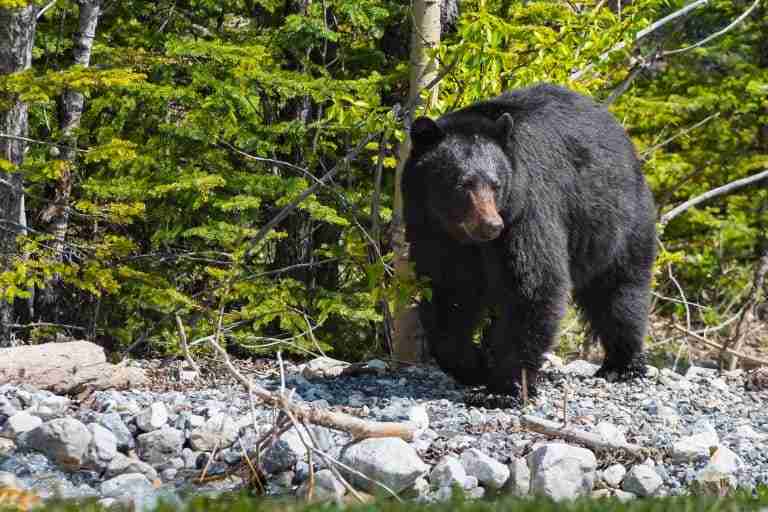Black bears are omnivores, whose feeding depends on the season and what is available. But similar to other bears, are they apex predators?
Yes! Black bears are apex predators. They are large and powerful animals sitting at the top of their food chain without any natural predators.
These bears feed on different diets, including berries, fish, insects, and small mammals. They help to control the populations of their prey and also spread nutrients throughout their environment.
There are more reasons why these bears are considered apex predators. But first, let’s see what apex predators are and what makes them different from other predators.
Let’s continue reading to find out.
Table of Contents
- What are Apex Predators?
- 5 Reasons Why Black Bears Are Considered Apex Predators
- Black Bear Food Chain – Diagram
- Do Black Bears Have any Predator?
- What Do Black Bears Prey on?
- Cannibalism: Do Black Bears Prey on Their Kind?
- Black Bears Predation – Active or Opportunistic?
- Related Questions:
- Recap
What are Apex Predators?
Apex predators are the most powerful predators in a food chain with no natural predators of their own. They keep a single species from taking over the environment by controlling their populations.
This way, the ecosystem remains in good health. Apex predators are mostly large and powerful animals.
They have the necessary hunting skills, physical features, and ability to win other animals for food.
5 Reasons Why Black Bears Are Considered Apex Predators
1. Black Bears Are Large And Strong Animals
Black bears are large creatures, with adult males reaching up to 6 feet tall on their hind legs and weighing up to 600 pounds (272 kg).
They have great strength, which they use to hunt their prey and even pursue animals larger than themselves.
2. They Are Skilled Hunters
Black bears are expert killers and hunters, taking advantage of any opportunity to feed. They have a great sense of smell, strong jaws, and sharp teeth.
Their bite force is about 800 PSI which is capable of inflicting injuries on any animal. These bears have curved claws up to 5 inches long.
They use them to capture and kill their prey, including deer, and small mammals. Black bears don’t mind spending hours tracking an animal, provided they kill it.
3. They Do Not Have Any Natural Predators
Black bears have no natural predators. This gives them the upper hand in their environment and helps them control the populations of other species.
Their behavior and intimidating appearance make it hard for any animal to hunt or eat them.
4. Black Bears Have Varieties of Diets
Black bears eat both plants and animals. Their sense of smell is incredibly powerful, allowing them to detect food sources from up to two miles away.
Their diet is mainly composed of berries, fruit, sedges, and insects. But they may occasionally eat fish, honeycomb, human food, and small mammals like deer, and elk.
This characteristic makes them highly adaptable so that they can survive in any kind of climatic conditions.
5. They Are Important To The Ecosystem
The presence of black bears is essential for the health of the ecosystem. They are important in maintaining the balance of nature by controlling the population of their prey.
Additionally, they help to spread nutrients throughout the ecosystem. Thus, their absence can affect the balance of the ecosystem.
Black Bear Food Chain – Diagram
Do Black Bears Have any Predator?
Black bears, especially adults, don’t have any natural predators in their environment. However, baby black bears are at risk of being preyed upon by bigger predators such as:
Wolves
Wolves are not known to be a primary predator of black bears. Nevertheless, there have been cases where they’ve been spotted attacking and killing black bear cubs.
These occurrences are rare because they happen when cubs are vulnerable or far from their mothers.
Mountain Lions (Cougars)
In areas where black bears and mountain lions coexist, cougars sometimes hunt black bear cubs. This mostly happens in mixed deciduous forests or foothill mountains.
This can be cubs staying alone or those hibernating with their mothers. This happens because they are easier to catch and not as powerful as their adults.
Grizzly Bears
Adult grizzlies are usually bigger and stronger than adult black bears. They can be a threat to black bear cubs or adult black bears that are weak and vulnerable.
Studies have proven that these grizzly bears kill cubs that are away from their mothers. They also prey on weak adults over the struggles for food or territory. Nonetheless, it happens rarely.
Other Black Bears
Adult black bears can be a danger to cubs of their species. In cases of competition over resources or territory, adult males can kill young black bears to reduce the competition.
This behavior is known as infanticide, and it happens especially if they are not the parent to the cub.
Take note:
Hunting and destruction of habitats by humans are the major problems these bear species are faced with.
Despite this, they avoid any confrontation with humans and are not aggressive unless they feel threatened.
What Do Black Bears Prey on?
Plants
- Sedge and Grasses – Sedge and grasses are readily available for black bears and are a source of fiber and other nutrients.
- Fruits and Berries – Black bears enjoy munching fruits and berries, such as blueberries, raspberries, blackberries, apples, and cherries.
- Nuts – Black bears will eat a variety of nuts, such as acorns, walnuts, and hazelnuts.
- Seeds – Black bears have a taste for a wide range of seeds, like pumpkin and sunflower seeds.
Animals
- Insects – Black bears eat a range of insects, such as ants, termites, and bees.
- Fish – Black bears are excellent swimmers who frequently fish in rivers and streams.
- Small Mammals – Black bears feed on a range of small animals, including mice, rabbits, and ground squirrels.
- Deer – Deer are the black bears’ main prey animal.
- Elk
- Carrions
Cannibalism: Do Black Bears Prey on Their Kind?
Yes, black bears prey on their kind! Cannibalism is not a common behavior among black bears, but it has been observed in some cases.
When food is scarce and adult black bears are desperate for sustenance, they have been known to prey on other black bears, including their young ones.
In addition, during mating season, adult male black bears can prey on each other to reduce competition for a mating partner.
Black Bears Predation – Active or Opportunistic?

Black bears are opportunistic predators. This means that they take advantage of any food sources that come their way rather than actively pursuing them.
Although they are not active hunters like polar bears and grizzlies, they are still capable of hunting. They can stalk their prey, or even ambush them if the chance arises.
Additionally, they are good at scavenging, and will often feed on carrion and deer.
Related Questions:
Are Brown Bears Apex Predators?
Yes, brown bears are the apex predators of their domains! They are found at the top of their food chain, with no natural predators to hunt them.
These animals are famous for their hunting skills, capable of taking down large animals like moose and caribou, as well as smaller prey like fish, rodents, and birds.
Are Grizzly Bears Apex Predators?
Grizzly bears (in-land brown bears) are apex predators with no natural predators. They are expert hunters of large animals such as elk, moose, and bison.
Besides, they eat a variety of other foods such as berries, insects, and fish. These animals are important to the environment, as they help to regulate the populations of their prey.
Are Polar Bears Apex Predators?
Yes! Polar bears are apex predators that occupy the highest level of the Arctic food chain. They are the largest land predators without any natural enemies.
They are well-known for their hunting abilities, sharp teeth, and powerful jaws. With these features, they hunt large animals such as seals and whales.
Are Giant Pandas Apex Predators?
Yes, giant pandas are apex predators in their habitat, with no natural predators to prey on them.
Even though they are primarily herbivores, they have sharp canines that they use to hunt and capture small animals such as rats, pikas, and other rodents.
Are Sloth Bears Apex Predators?
Yes, sloth bears are considered apex predators. This means they are at the top of their food chain and have no natural predators.
Their diet mainly consists of ants and other insects, but they also feed on rodents, birds, and carrion.
Recap
In summary, black bears are apex predators. They are found at the top of their food chain and have nothing in nature that hunts them for food.
These animals are considered apex predators because of the following reasons:
- Black bears are large and powerful animals
- They are skilled hunters even though they do not hunt actively.
- They do not have any animals in nature hunting them for food.
- Black bears eat a variety of food, both plants and animals.
- They are a critical part of the ecosystem as they help to control the population of other animals
However, black bears have predators such as wolves, grizzly bears, mountain lions, and even other black bears. These animals often hunt black bear cubs.
Now, you’ve learned that black bears use any opportunity they get to kill and eat their prey including elk and carrions.
But do you think they can do the same thing to dogs or will they rather run away?
Find out in our article ‘’ Are Black Bears Dangerous To Dogs? ’’
Sources:
Understanding Cannibalism in the Largest Land Carnivores.
The Role of American Black Bears and Brown Bears as Predators on Ungulates in North America.
The Role of Bears in The Ecosystem

